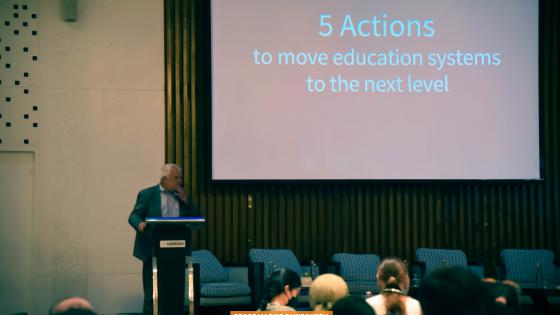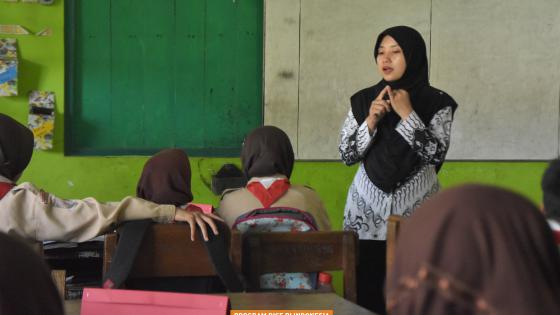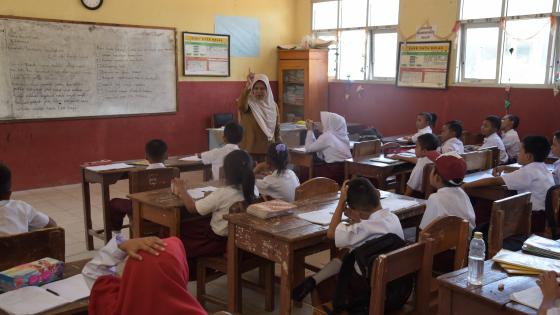Photo illustration: Tony Liong
.
This article was originally posted on The Conversation Indonesia and has been translated by RISE team.
.
Becoming a civil servant teacher is arguably every Indonesian teacher’s dream as the status ensures financial stability provided by the government.
For this reason, many teachers choose to remain honorary (informally hired) despite receiving low pay while waiting for the open recruitment of state civil apparatus vacancies. They keep taking the civil service exams, hoping that one day they will pass the selection and enjoy the prestige afforded by the status of civil servant.
Does this mean that the drive to become a civil servant teacher results in quality teachers?
A study by SMERU describes how civil servant teacher recruitment in Indonesia fails to attract quality teacher candidates because the selection process overlooks the mastery of teacher competence. Moreover, civil servant status eventually becomes a “comfort zone” for teachers because there is little room for capacity building.
As one novice teacher confided in our study:
“It’s been hard for me to stay motivated lately because I have been in a comfort zone for the past year. Being a prospective civil servant suddenly feels like a burden […] I’m worried that I’d become a teacher paid by the government but not doing my best.”
We also conducted a study that followed the journey of sixteen novice teachers in Java from 2019 to 2020.
We found that policies related to civil servant teachers have failed to motivate them to achive high standards of competence, and offer little incentives for them to grow professionally.
This policy discrepancy is evident throughout the process of teacher training, while teaching at school, to when the teachers are trying to move up the career ladder.
Inadequately trained, left to fend for themselves
The problem with teacher development in Indonesia starts early in the teachers’ career.
All novice teachers in our study are graduates of the Pre-Service Teacher Professional Education (PPG) programme. The objective of the Programme is to equip prospective teachers with the four competencies required of a professional teacher: professional, pedagogical or instruction, personality, and social.
Nevertheless, the novice teachers felt the PPG was inadequate and that the knowledge they gained from the Programme was different from what they experienced in the classroom. This disconnection made the novice teachers felt incompetent and less confident in giving instructions.
The initial findings of our study showed that only 12.4% of the PPG graduates felt they had mastered the literacy and numeracy subjects students need to learn.
Even after getting a teaching job at a school, novice teachers are commonly given advanced roles, including teaching multiple subjects or classes.
Lack of induction is especially experienced by novice teachers of public schools. Ideally, upon entering a new school environment, novice teachers undergo a probationary period, are introduced to good practices, and receive in-service training and education from the school.
But our study found the induction received by civil servant teachers focuses more on administrative matters, attendance, and discipline.
Meanwhile, teachers of good quality private schools go through a proper induction for a month before the new school year begins. The induction covers the introduction of the school curriculum, teacher performance evaluation, culture, and environment.
Proper induction equips novice teachers with the knowledge of the school work system, allowing them to start their new role with better preparation and expectations.
Lack of platform for growth
Ideally, over the course of their profession, teachers have a platform(s) to discuss teaching issues with their peers to respond to challenges in the classroom.
However, our respondents, particularly civil servant teachers of the public schools, were not afforded such a luxury. They must rely on their self-initiatives to discuss with senior teachers or the principal.
On the other hand, the existing teacher group, such as teacher working groups, are viewed as too rigid and monotonous to cater to the needs of early-career teachers.
Novice teachers then initiated alumni groups that enable them to share and ask questions concerning teaching obstacles.
In fact, the State has a flagship teacher professional development programme, the Continuous Professional Development (PKB), to update teacher competencies continuously.
However, the Programme serves mainly as an administrative checklist rather than a space for learning and enhancing teacher competencies in practice.
Novice teachers are also not eligible to attend PKB because participation in this programme is based on assignments and teaching experience rather than the teacher’s needs.
Career path for teachers in Indonesia is unclear
Another problem is the unclear career path for teachers in Indonesia.
“Career evolution” of civil servant teachers is regulated in the Ministerial Decree for State Apparatus Empowerment and Bureaucratic Reform (Permen PAN RB) No. 16/2009. Civil servant teachers’ promotion is based on credit scores collected through four ways: education, learning, continuous professional development, and teacher supporting tasks.
However, in reality, teacher promotion in Indonesia is based more on years of service, which our respondents also acknowledged.
In Singapore, teachers can choose one of the three tracks offered formally for their career ladder: teaching track, leadership track, or specialist track—the last is an option for teachers who want to contribute to the research field. In pursuing the career ladder, teachers must achieve specific competencies at each rung of the ladder of the track they choose.
Meanwhile, in Indonesia, there is no clear roadmap and criteria for the progression of a teaching career.
Civil servant teacher career structure follows the civil service promotion system for all professions—not specifically regulated for the teaching profession. Even worse, honorary teachers do not have a clear career path.
Some of our respondents said that eventually, they use the civil servant status as a stepping stone to reach higher bureaucratic positions—for example, to secure a particular rank or become a bureaucrat in the education office.
Moreover, in countries like Ecuador and Thailand, and some European countries, remuneration is part of teacher career development.
Some studies showed that teacher career development policies that reward high-performing teachers could improve the quality of education. Studies in remote areas of Indonesia also demonstrated that the provision of performance-based allowances based has succeeded in improving student learning outcomes.
In Indonesia, however, there has yet a national policy that differentiates teacher salaries based on their performances. High-performing teachers receive the same pay as low-performing ones.
Fix teacher career development policies to attract high-quality candidates
Inadequate teacher capacity development policies create unsupportive environment for novice teachers to develop their careers.
In fact, many novice teachers enter this profession because of their passion, not just because of the benefits of being civil servant teachers.
But right away, at the beginning of their career, they are met with poor “acceptance” and are further demotivated by the non-quality-oriented civil service system.
A more definitive standard in defining teachers must be established as it can serve as the basis for a teacher’s career structure and professional development. A clear structure would attract quality teacher candidates to establish competent and professional teachers.








